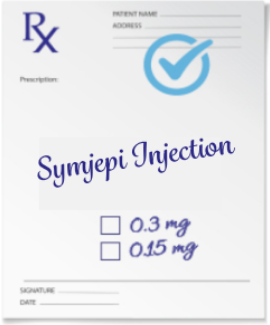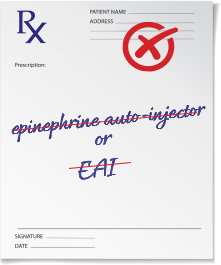Indication
SYMJEPI is indicated in the emergency treatment of allergic reactions (Type 1) including anaphylaxis to stinging insects (e.g., order Hymenoptera, which include bees, wasps, hornets, yellow jackets and fire ants) and biting insects (e.g., triatoma, mosquitoes), allergen immunotherapy, foods, drugs, diagnostic testing substances (e.g., radiocontrast media) and other allergens, as well as idiopathic anaphylaxis or exercise-induced anaphylaxis.
Important Safety Information
Contraindications
None.
Warnings and Precautions
- You should get emergency medical care right away after using SYMJEPI.
- You may need to use a second SYMJEPI (epinephrine) injection if symptoms continue or recur. Only a healthcare provider should give additional doses of epinephrine if you need more than 2 injections for a single anaphylaxis episode.
- SYMJEPI should only be injected into the middle of your outer thigh (upper leg) with the needle facing downwards. Never inject into any other part of the body. If you accidentally inject SYMJEPI into any other part of your body, go to the nearest emergency room right away. Tell the healthcare provider where on your body you received the accidental injection. SYMJEPI can be injected through your clothing if needed.
- The needle cap on the SYMJEPI prefilled syringe helps to prevent needle sticks and accidental injection of epinephrine. Do not remove the needle cap until you are ready to use it.
- Never put your thumb, fingers, or hand over the exposed needle.
- If an accidental injection happens, get medical help right away.
- Do not drop the carrier case or SYMJEPI prefilled syringe. If the carrier case or prefilled syringe is dropped, check for damage and leakage. Dispose of the prefilled syringe and carrier case, and replace if damage or leakage is noticed or suspected.
- Do not place patient information or any other foreign objects in the carrier case with the prefilled syringe, as this may prevent you from removing the prefilled syringe for use.
- If you inject a young child with SYMJEPI, hold their leg firmly in place before and during the injection to prevent injuries. Ask your healthcare provider to show you how to properly hold the leg of a young child during injection.
- Before using SYMJEPI, tell your healthcare provider about all of your medical conditions, including if you:
- have heart problems or high blood pressure.
- have diabetes.
- have thyroid problems.
- have asthma.
- have a history of depression.
- have Parkinson’s disease.
- are pregnant or plan to become pregnant. It is not known if epinephrine will harm your unborn baby.
- are breastfeeding or plan to breastfeed. It is not known if epinephrine passes into your breast milk.
Adverse Reactions
SYMJEPI may cause serious side effects.
- Rarely, patients who have used SYMJEPI may develop infections at the injection site within a few days of an injection. Some of these infections can be serious. Call your healthcare provider right away if you have any of the following at an injection site:
- redness that does not go away
- swelling
- tenderness
- the area feels warm to the touch
- Cuts on the skin, bent needles, and needles that remain in the skin after the injection, have happened in young children who do not cooperate and kick or move during the injection.
- If you have certain medical conditions, or take certain medicines, your condition may get worse or you may have longer lasting side effects when you use your SYMJEPI. Talk to your healthcare provider about all your medical conditions.
Common side effects of SYMJEPI include:
- fast, irregular or “pounding” heartbeat
- sweating
- headache
- weakness
- shakiness
- paleness
- feelings of over excitement, nervousness or anxiety
- dizziness
- nausea and vomiting
- breathing problems
These side effects may go away with rest. Tell your healthcare provider if you have any side effect that bothers you or that does not go away. These are not all the possible side effects of SYMJEPI. For more information, ask your healthcare provider or pharmacist.
Drug Interactions
- Tell your healthcare provider about all the medicines you take, including prescription and over-the-counter medicines, vitamins, and herbal supplements.
- Tell your healthcare provider of all known allergies.
- Especially tell your healthcare provider if you take certain asthma medicines.
- SYMJEPI and other medicines may affect each other, causing side effects. SYMJEPI may affect the way other medicines work, and other medicines may affect how SYMJEPI works.
- Know the medicines you take. Keep a list of them to show your healthcare provider and pharmacist when you get a new medicine.
Please see full Prescribing Information for SYMJEPI.
To report SUSPECTED ADVERSE REACTIONS, contact Adamis Pharmaceuticals Corporation at 1-800-230-3935 or FDA at 1-800-FDA-1088 or www.fda.gov/medwatch.

